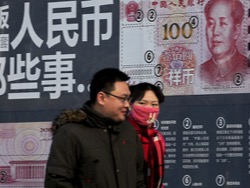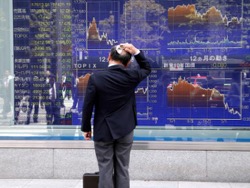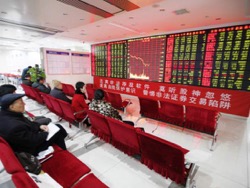
Economic data show that the model of success of China has outlived its usefulness. The country will face the fate of Japan’s economic stagnation and rising debt. Bad news for German exporters.
For three decades, China undoubtedly was the star of the world economy. Economic reform and opening of China in the mid 80-ies spurred incredible growth that delivered from poverty hundreds of millions of Chinese, and made the country the second largest economy in the world. This development has affected the entire world economy has caused a boom in commodity-rich developing countries and helped the German engineers and manufacturers earn billions.
But now China’s economy is faced with problems. This is confirmed by economic data. In may exports fell more than expected by 4.1% compared to the previous year. Chinese exporters reduced sales volumes overseas in April. The industry has cut production, companies are investing less, consumers also refrain from shopping.
From the euphoria left over. China’s economy is weakening, and experts fear that the leadership in Beijing is too busy himself to counter this. But if politicians refuse necessary reform, China could become Japan 2.0: an economy that is barely noticeable growth and growing debt that is held by public investment.
The cause of the economic weakness of China — progress in recent decades. Although this vast country, millions of people still live below the poverty line, China has become so rich that he can no longer grow within this development model.
This model has worked for many years. Company in the country has become the “workbench” of the globalized world. Millions of Chinese left field and moved to the rapidly growing city to work in steel mills and garment factories. The same efforts have contributed to the growth in production volumes, and with it grew wealth.
Meanwhile, rapidly rising incomes allowed the companies to Finance the purchase of new furnaces, the construction of factories and offices, and the government could provide the country with roads, airports, and fiber optic networks. Private and public investment gave further impetus to the growth until they reached a dead point.
Although public investment no longer promote growth, but the debt is still growing. Allocate money for the construction of factories, whose products nobody buys, roads that drive cars and houses in the provincial cities that are not wanted. Strategy “to build factories and wait for the clients” no longer works.
At the same time, the population is aging rapidly. Last year the number of Chinese of working age decreased for the first time, and according to the UN, continues annually to fall by half a percentage point. China ends the labor force and it provides for wage increases. To turn agricultural workers into factory workers, too, will no longer work.
Despite the need for reform, nothing happens
The Chinese leadership understands this, so he outlined a future programme of reforms. In the future, the economy will grow thanks to the services and not capital-intensive exports. Those industries dominated by large state enterprises should be deregulated, it will provide small private companies greater freedom. State-owned enterprises should be restructured and then privatized, the financial sector also needs reforms. The state and the economy must be divided.
The recipes are clear. “But nothing happens”, says Arthur Kroeber, co-founder and scientific Director of the research company Gavekal Dragonomics. He spent many years watching the economic development of China, and he has two explanations as to why nothing is happening, despite the need for reform. Resistance politicians in the regions and municipalities more than expected by reformers in the Central government. We are talking about the separation of politics and business, and local politicians across the country earned this regard billions.
In addition, the “political leadership is also in disarray,” said Kroeber. Representatives of the administration, which in recent decades very carefully managed economic development, are aware of what steps need to be taken. But political leaders, especially the head of the party XI Jinping is not going to give more power than necessary. Anyway, now si is interested in how to best strengthen your position in the party. “Economic policy XI Jinping and his advisers characterized by a deep split,” says Kroeber.
Trapped between high debt and low growth
Probably the necessary economic reforms will not. “There are fears that the government for too long pulls reforms,” warns Lutz Karpowitz, the China expert at Commerzbank. “So in the coming years, an ageing population and reduction in workforce will cause even greater harm to the Chinese economy.”
Economist Kroeber argues that in the next five to ten years, the Chinese economy may follow Japan’s example. “China will be trapped between high debt and low growth”. The party is so concerned about the internal stability of the country that will continue to pump money into the economy.
In Japan, after many successive stimulus programs most of the country disappeared under the concrete. Now the Chinese leadership also wants to continue to invest in infrastructure. “It will not lead to an increase in productivity in the economy, but will create jobs and help to attract money to the economy,” says Kroeber. “The welfare state will grow. In fact, most of the population would not be economic prospects, but, in General, they’ll be fine.”
Such a policy of China will be sent into the country, resulting in slowing economy. This is bad news for the global economy as well as for those German companies, a large part of the turnover takes place in China. The company will not collapse overnight, but strong growth in the next few years should be expected.








